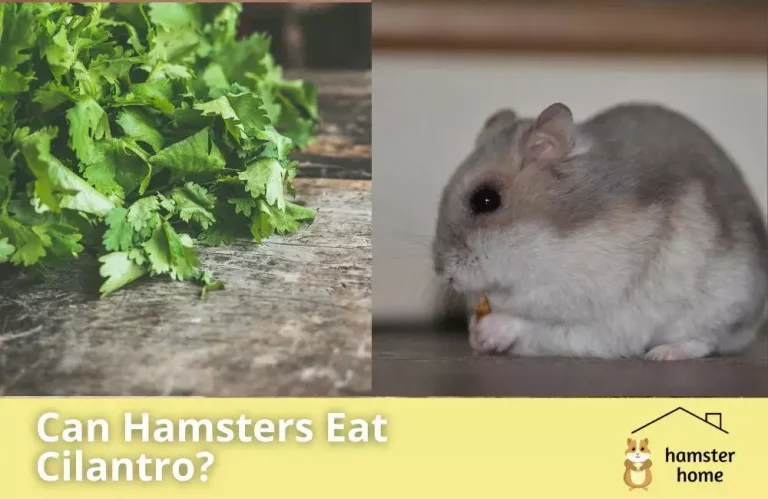So, is it viable to feed cilantro to your hamster? Yes, you can feed cilantro to your pet. It’s safe for her in a moderate or small amount. In fact, it has some rare qualities. For instance, it is packed with tons of essential minerals and vitamins. On top of that, it is a low-calorie food- decreasing the chances of obesity in hamsters.
Like many herbs, it can be a delicious treat for your hammy. As with any treat, it is vital to keep in check the amount being fed. Stick till the end, so you don’t make any mistakes while feeding cilantro to your hamster.
Advantages of Feeding Cilantro to Your Hamster
A quarter cup of cilantro contains only one calorie, no fats, 1 gram of fiber, and almost no carbohydrates. It contains Vitamins and minerals like Vitamin C, Provitamin A, K, Folate, Potassium, and manganese. As the nutritional facts show, cilantro is not a substantial energy source. Still, it contains a fair number of essential vitamins and minerals that are necessary for normal body functioning and growth.
Another great advantage of giving cilantro as a treat to your critter is that it can be grown at home. You can grow cilantro in your backyard without any hustle since it does not require any safekeeping at all. A home-grown organic snack for your rodent is far better than purchased or canned snacks. Cheaper and safer than any other treat you can offer to your hammy.
Guidelines and Risks Associated with Feeding Cilantro to Your Hamster
Cilantro should be given as a treat in moderate amounts and frequency. Otherwise, it can cause acidity in the stomach of your hamster that may ultimately lead to other gastrointestinal disorders like an ulcer. Their gut problems can become fatal if handled carelessly- therefore, you must keep an eye on what your little friend is eating. In addition, if you want to plant cilantro at home, make sure your hamster cannot reach there.
Baby hamsters should not be offered this snack. Having a relatively more sensitive tummy, they won’t be able to bear the acidity and may fall ill. Quantity and frequency are essential factors for feeding cilantro to your rodent. Lastly, do not feed it anything acidic after having cilantro, certainly not on the same day.
Do Hamsters like Cilantro?
Well, it is a subjective matter. Some hamsters love it and will merrily gulp any amount offered to them. However, others will sniff and go away. It is the same as humans; some love the taste of cilantro, and some regard it as soap. Try to feed cilantro to the hamster, and if it goes away after sniffing, take it out of the cage and do not force it. There is nothing you can do if the hamster does not like it.
How Should I Feed Cilantro to My hamster?
If you own an adult hamster, give it a pinch of cilantro once a week. A pinch contains a few leaves, which would be enough for it. Wash the leaves thoroughly before serving. If your hammy is not used to eating fresh products, then you should offer milder veggies like cucumber before offering sharp and zingy herbs like cilantro. Once your hamster becomes used to fresh products, then you can serve cilantro to it. However, remember, not more than just a pinch.
FAQs
In the wild, hamsters, like other fellow rodents, are incredibly adapting omnivores. However, domesticated hamsters are relatively fragile. Hence, you have to be extra cautious about their diet when it comes to herbs. You can feed Dill, Mint, Basil, and Oregano to your hamster but make sure they are not allergic to them.
No, your hamster cannot have cilantro seeds. They can be very toxic due to their acidic nature. That being the case, stick to the leaves and don’t do unnecessary experimentation with your hamster’s diet.
Hamsters And Cilantro In A Nutshell
Your hamster can eat cilantro but in a limited amount and frequency. Otherwise, it can be fatal for your little friend. Try to feed them home-grown cilantro rather than purchased or jarred since they contain preservatives that are not good for your friend.
As a guardian, you must observe how the food affects your pet’s health and behavior. If you see any anomaly in her health or behavior, consult with a vet as soon as possible because they are very fragile creatures, so take care of them.






